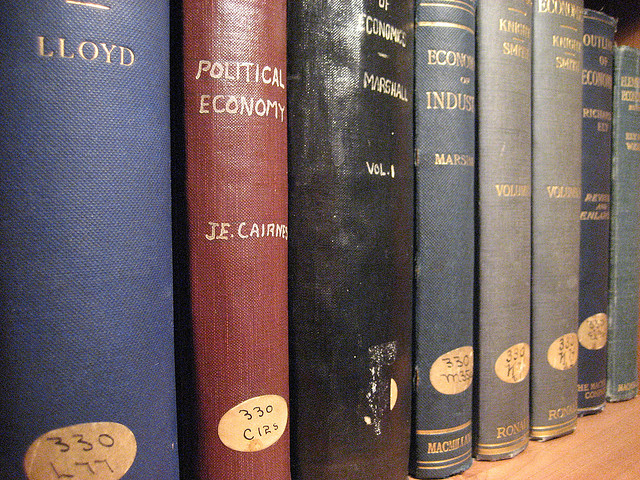Tim Hudak is a great example of the damage a good education can do. So is Stephen Harper. Both are products of university economics departments in the late 20th century. Each has a proud MA in the field. Like their American cognate — Paul Ryan — they’ve chosen to implement economic policy with no or little experience in the work world. Hudak worked briefly at a low level for Walmart; almost an internship. Since then — all politics.
Here’s what they learned from courses in post-Keynesian, Friedmanite economics. It’s pure theory. It says the world works best when everyone comes to market, like a little piggy, with whatever they have: money, skills, needs. They dicker and set prices for each other’s stuff and the best possible outcome results. Anything that interferes with these individual interactions is a Bad Thing.
They know (because they were taught) that the ideal may not always be achievable in every way. But you should do your best to keep things as pure as possible. I take them as intellectual idealists who swear by this stuff; people who get their hands dirty in business are less likely to be true believers, though they can see the usefulness of guys with the pure faith like Hudak and Harper.
That’s why they hate unions. Unions interfere with those Robinson Crusoe-esque individuals interacting in solitary perfection. It absolutely ruins the model they lovingly learned. It’s amazing how influential ideas you imbibed when you were impressionable can be. Keynes said, “the world is ruled by little else.” But he spoke as the Great Contrarian to “classical” economics.
So Stephen Harper has done what he can to scourge the union landscape. He sent railway and airline workers back to work or voided strikes before they began. He’s prepared legislation to impede union action and undermine public sector unions — including inserting his government, rather than an impartial board, as the decider on essential services. Hudak seems ready to run an almost entirely anti-union campaign in Ontario’s next election. He models it on U.S. “right to work,” or “right to work for less,” laws.
The reason I invoke their youthful academic formation, is that these battles have been largely won. The labour movement is a shadow of what it was. The manufacturing sector, which used to lead and had the best contracts, was savaged by free trade deals that let owners move plants elsewhere, or threaten to and get concessions. In Ontario just recently, we’ve lost Heinz in Leamington, Kellogg’s in London, Electro-Motive Diesel also in London, U.S. Steel in Hamilton, Redpath Sugar in Niagara, Bick’s in Dunnville, Chatham’s Navistar and the St. Thomas Ford plant. And they were a remnant of the remnant. Only the public sector unions retain any vigour, since they’re harder to free-trade out, and they now face the blast, as trade deals continue to rain down on us.
Yet Harper and Hudak rail on, as if fearful the corpse might rise from its coffin — which it might; there are efforts to resuscitate labour. And if those fail, some new version to represent the new workforce could emerge. Devout intellectual crusaders never let down their guard. I actually think in Hudak’s case, it’s electorally counterproductive. There’s lots of sympathy, or just nostalgia, in Ontario for the old days of union wages as community backbones.
It’s as if he’s trying to shut the barn door after the horse he wants to liberate — the one that undermines unions — has bolted. But the most he can do is close that door so the horse can’t get back in. Why would it even want to? That’s why I call it less a sign of calculation or meanness, than intellectual romanticism.
I should acknowledge, re: the real influence of abstract theory, ECONned, by Yves Smith of nakedcapitalism.com, who notes the special delusion of economists: “Every social science save economics rests on the assumption of human irrationality.” She has gobs of Wall St. experience plus the best pen name on the Internet. I could also mention Canada’s foremost academic, economist Harold Innis, who approvingly cited someone else saying: “the whole external history of science is a history of the resistance of academies and universities to the progress of knowledge.”
This article was first published in the Toronto Star.
Photo: genericface/flickr



